O, lift me from the grass!
I die, I faint, I fail!
Let thy love in kisses rain
On my lips and eyelids pale.
My cheek is cold and white, alas!
My heart beats loud and fast:
O, press it close to thine again,
Where it will break at last!
Very few perhaps are familiar with these lines, yet no less a poet than Shelley is their author. Their warm, yet delicate and ethereal imagination will be appreciated by all, but by none so thoroughly as by him who has himself arisen from sweet dreams of one beloved to bathe in the aromatic air of a southern midsummer night.
One of the finest poems by Willis, the very best in my opinion which he has ever written, has no doubt, through this same defect of undue brevity, been kept back from its proper position, not less in the critical than in the popular view:
The shadows lay along Broadway,
’Twas near the twilight-tide—
And slowly there a lady fair
Was walking in her pride.
Alone walk’d she; but, viewlessly
Walk’d spirits at her
side.
Peace charm’d the street beneath
her feet,
And honor charm’d the
air;
And all astir looked kind on her,
And called her good as fair—
For all God ever gave to her
She kept with chary care.
She kept with care her beauties rare
From lovers warm and true—
For heart was cold to all but gold,
And the rich came not to woo—
But honor’d well her charms to sell,
If priests the selling do.
Now walking there was one more fair—
A slight girl, lily-pale;
And she had unseen company
To make the spirit quail—
Twixt Want and Scorn she walk’d
forlorn,
And nothing could avail.
No mercy now can clear her brow
From this world’s peace
to pray,
For as love’s wild prayer dissolved
in air,
Her woman’s heart gave
way!—
But the sin forgiven by Christ in Heaven,
By man is cursed alway!
In this composition we find it difficult to recognise the Willis who has written so many mere “verses of society.” The lines are not only richly ideal but full of energy, while they breathe an earnestness, an evident sincerity of sentiment, for which we look in vain throughout all the other works of this author.
While the epic mania, while the idea that to merit in poetry prolixity is indispensable, has for some years past been gradually dying out of the public mind, by mere dint of its own absurdity, we find it succeeded by a heresy too palpably false to be long tolerated, but one which, in the brief period it has already endured, may be said to have accomplished more in the corruption of our Poetical Literature than all its other enemies combined. I allude to the heresy of The Didactic. It has been assumed, tacitly and avowedly, directly and indirectly, that the ultimate object of all Poetry is truth. Every




